Discover Syntax - Tasty Web Development Treats
Syntax - Tasty Web Development Treats

Syntax - Tasty Web Development Treats
Author: Wes Bos & Scott Tolinski - Full Stack JavaScript Web Developers
Subscribed: 15,635Played: 984,040Subscribe
Share
Description
Full Stack Developers Wes Bos and Scott Tolinski dive deep into web development topics, explaining how they work and talking about their own experiences. They cover from JavaScript frameworks like React, to the latest advancements in CSS to simplifying web tooling.
966 Episodes
Reverse
Wes and Scott revisit their 2025 web development predictions, grading hits and misses across AI, browsers, frameworks, CSS, and tooling. From Temporal and AI coding agents to React, Vite, and vanilla CSS, they reflect on what actually changed, what stalled, and what it all means heading into 2026.
Show Notes
00:00 Welcome to Syntax!
866: 2025 Web Development Predictions
01:26 Temporal API will ship in the browser
03:33 On-device AI becomes common
06:14 WebGPU unlocks fast local machine learning
TypeGPU
07:10 Models will plateau
10:32 Is there an actual use case for video and photo gen AI?
13:27 Text to UI tools get really good
16:25 Framework choice will matter less
18:53 Web components in Standard Stack, Web Awesome takes off
21:37 AI browsers and Copilot Workspace-style tools will become normal
22:56 AI browsera will become inevitable, OpenAI will launch a browser
27:51 Relative color will feel fully “safe to use”
29:02 Vanilla CSS will make a comeback
30:33 Brought to you by Sentry.io
30:58 CSS mixins and functions spec solidifies
CSS Custom Functions and Mixins Module Level 1
33:25 Container style queries will ship everywhere
CSS if statements
35:40 Vertical centering jokes will stubbornly persist
36:20 VS Code will reach feature parity with Cursor
38:47 More VS Code forks will appear
39:46 React Compiler drops Babel
40:34 React server components will pop
42:17 Remix re-emerges as something new
43:17 React Native will have its time
44:21 TanStack Start and Tanstack will pop
45:46 SvelteKit gets more granular data loading
46:06 Local first apps will take off
46:43 Bun keeps doing “wild but loved” non-standard features, Bun will launch a platform-as-a-service
48:22 Vite stays king
51:07 Laravel will release a CMS
52:44 Sick Picks + Shameless Plugs
Sick Picks
Scott: DARKBEAM Flashlight UV Black Light
Wes: WOOZOO Fan
Hit us up on Socials!
Syntax: X Instagram Tiktok LinkedIn Threads
Wes: X Instagram Tiktok LinkedIn Threads
Scott: X Instagram Tiktok LinkedIn Threads
Randy: X Instagram YouTube Threads
Scott and Wes break down the biggest web platform features that reached Baseline in 2025, separating the genuinely useful APIs from the niche and forgettable ones. From same-document view transitions and the Popover API to Promise.try, content-visibility, and modern CSS goodies, they share what’s actually ready to use today.
Show Notes
00:00 Welcome to Syntax!
01:37 24 new web APIs that reached baseline in 2025.
01:49 Same-document view transitions for single-page applications.
05:28 abs()
08:22 Brought to you by Sentry.io.
09:20 JSON Module Scripts.
10:10 Popover API.
13:07 Base64 to UInt8Array.
Better Binary Batter Mixing
16:11 @starting-style
Scott’s A CSS Only Accordion with
Scott’s Mobile Nav
17:39 allow-discrete
21:31 Promise.try
22:51 content-visibility
Hit us up on Socials!
Syntax: X Instagram Tiktok LinkedIn Threads
Wes: X Instagram Tiktok LinkedIn Threads
Scott: X Instagram Tiktok LinkedIn Threads
Randy: X Instagram YouTube Threads
In this potluck episode of Syntax, Wes and Scott answer your questions about keyboard shortcuts, choosing frameworks in the age of AI, markdown vs CMSs, backup strategies, moving countries for work, staying relevant as a developer, and more!
Show Notes
00:00 Welcome to Syntax!
02:28 Do keyboard shortcuts actually improve productivity?
Hyperkey
08:41 What is Error Lens, and why use it?
Ep 956: Should I Keep Using WordPress?
11:44 How Scott is using a Svelte 5 service worker
14:52 Does tech stack choice still matter with AI coding?
Ep 951: A first look at Remix 3
20:15 What stack should you choose for a greenfield SaaS?
22:38 What’s the right stack for a band website?
28:24 Is moving countries for work worth the tradeoff?
34:59 Brought to you by Sentry.io
36:16 How should you manage commits with AI tools?
40:50 Is programming still a good career in the AI era?
47:03 How should you back up large files and media?
Ep 949: Web Dev HORROR Stories + Spooky Trivia! (Spooky Stories Pt. 1)
Ep 962: The Home Server / Synology Show
53:29 What backup setup works for small teams and clients?
55:14 How should you store sensitive files safely?
58:07 Sick Picks + Shameless Plugs
Sick Picks
Scott: Philips LED Ultra Definition
Wes: LEGO Builder App
Hit us up on Socials!
Syntax: X Instagram Tiktok LinkedIn Threads
Wes: X Instagram Tiktok LinkedIn Threads
Scott: X Instagram Tiktok LinkedIn Threads
Randy: X Instagram YouTube Threads
Scott and Wes chat with YouTuber and security consultant Matt Brown about breaking into IoT devices, extracting firmware, and decoding the hidden tech inside everyday gadgets. Matt shares his methods, the legal boundaries, and the wild stories behind his most interesting hacks.
Show Notes
00:00 Welcome to Syntax!
01:21 Curiosity in Hacking
03:28 Understanding IoT Devices
07:15 Brought to you by Sentry.io.
07:40 Linux vs Microcontrollers
10:11 UART Console Access
13:56 Firmware Extraction Techniques
14:19 Guessing Usernames and Passwords
19:22 Extracting Password Hashes
23:15 Legal Considerations in Hacking
30:06 Where does the inspiration come from?
31:20 Using Logic Analyzers
37:45 CAN Protocol in Automotive
45:42 Influence of Lewis Rossman
54:05 Sick Picks & Shameless Plugs
Sick Picks
Matt: Key Person of Influence
Shameless Plugs
Matt:Matt Brown on YouTube, Brown Fine Security
Hit us up on Socials!
Syntax: X Instagram Tiktok LinkedIn Threads
Wes: X Instagram Tiktok LinkedIn Threads
Scott: X Instagram Tiktok LinkedIn Threads
Randy: X Instagram YouTube Threads
Wes and Scott talk about their evolving home-server setups—Synology rigs, Mac minis, Docker vs. VMs, media servers, backups, Cloudflare Tunnels, and the real-world pros and cons of running your own hardware.
Show Notes
00:00 Welcome to Syntax!
01:35 Why use a home server?
07:29 Apps for home servers
16:23 Home server hardware
18:27 Brought to you by Sentry.io
20:45 VMs vs containers and choosing the right software
25:53 How to expose services to the internet safely
30:38 Securing access to your server
Hit us up on Socials!
Syntax: X Instagram Tiktok LinkedIn Threads
Wes: X Instagram Tiktok LinkedIn Threads
Scott: X Instagram Tiktok LinkedIn Threads
Randy: X Instagram YouTube Threads
Scott and CJ go live from JS Nation NYC to talk about how developers can actually stay current without drowning in the constant churn of new tools and trends. They break down how to see through the fluff, focus on why tech exists before adopting it, and build a healthier, curiosity-driven approach to learning in 2025 and beyond.
Show Notes
00:00 Welcome to Syntax!
00:39 Scott delivering a non-technical talk at JS Nation.
03:24 Lamenting the frequency of change as developers.
03:46 Understanding why things exist before deciding to learn them.
05:11 Learning styles are a myth?
07:41 First dates and psychology exams.
10:39 Discovering is step one, playing is step two.
13:32 Learn with a project that you actually want.
18:16 Brought to you by Sentry.io.
18:34 Cutting through the noise of new tech.
21:40 Using AI as a learning tool
25:12 Sick Picks & Shameless Plugs.
Sick Picks
Scott: dbrand Ghost Case 2.0
CJ: analog watches
Hit us up on Socials!
Syntax: X Instagram Tiktok LinkedIn Threads
Wes: X Instagram Tiktok LinkedIn Threads
Scott: X Instagram Tiktok LinkedIn Threads
Randy: X Instagram YouTube Threads
Wes and Scott talk about the weird, creative corners of the web—from live-coded music with Strudel and wild Hydra visuals to shader wizardry, projection-mapping art, fully synced Christmas lights, and more.
Show Notes
00:00 Welcome to Syntax!
01:10 Strudel
https://www.tiktok.com/@dj_dave__/video/7541104277234748685
https://www.tiktok.com/@switch.angel/video/7542776528057257229
03:45 Hydra
https://www.tiktok.com/@spacetiger3000/video/7552354878635511095?q=hydra%20video%20synth&t=1762879433461
05:44 P5.js
https://www.tiktok.com/@julian_hespenheide/video/7408511121323248929?q=p5.js%20&t=1762879954031
https://www.tiktok.com/@m171148385929472638284/video/7544793538496679190?q=p5.js%20&t=1762879954031
08:03 ShaderToy
https://shaders.com/
https://www.shadertoy.com/view/ldlcRf
https://www.tiktok.com/@phi.graphics/video/6927475445059292421?q=shadertoy&t=1762879566343
https://www.tiktok.com/@fifi_cgi/video/7255109146062687494?q=shadertoy&t=1762879566343
11:13 Brought to you by Sentry.io
11:37 MadMapper
https://www.tiktok.com/@dfiftyd50/video/7556202990529563920
https://www.tiktok.com/@dfiftyd50/video/7569626387577965844?q=projection%20mapping&t=1762879388084
14:13 Touch Designer
https://www.reddit.com/r/TouchDesigner/
https://www.tiktok.com/@bedareveryday/video/7558850186601172246?q=Touch%20Designer&t=1762879652502
https://www.tiktok.com/@maze88196/video/7521311510488943894?q=Touch%20Designer&t=1762879652502
https://www.tiktok.com/@valen.bertol/video/7475117172847562039?q=Touch%20Designer&t=1762879652502
16:45 xLights
https://www.tiktok.com/@ravespotlight/video/7311729112425516320?q=lights%20christmas&t=1762879799384
https://www.tiktok.com/@thatlightguy_/video/7315199858338565418?q=xlights%20show&t=1762879927155
20:19 Sick Picks + Shameless Plugs
Sick Picks
Scott: NeueCast
Wes:
6 Port 2.5G Unmanaged Ethernet Switch
UGREEN USB to Ethernet Adapter 2.5Gb
Hit us up on Socials!
Syntax: X Instagram Tiktok LinkedIn Threads
Wes: X Instagram Tiktok LinkedIn Threads
Scott: X Instagram Tiktok LinkedIn Threads
Randy: X Instagram YouTube Threads
Scott and CJ sit down live at JSNation NYC with Iwo Plaza, creator of TypeGPU, to dig into how WebGPU is unlocking a new wave of graphics and compute power on the web. They chat about shader authoring in TypeScript, the future of GPU-powered AI in the browser, and what it takes to build a killer developer-friendly graphics library.
Show Notes
00:00 Welcome to Syntax!
00:32 What is TypeGPU? High-level overview and why it exists
01:20 WebGPU vs WebGL – the new era of GPU access on the web
01:47 Why shader languages are hard + making them accessible
02:24 Iwo’s background in C++, OpenGL, and discovering JS
03:06 Sharing graphics work on the web vs native platforms
03:29 WebGPU frustrations that inspired TypeGPU
04:17 Making GPU–CPU data exchange easier with Zod-like schemas
05:01 Writing shaders in JavaScript + the unified type system
05:38 How the “use_gpu” directive works under the hood
06:05 Building a compiler that turns TypeScript into shader code
07:00 Type inference, primitives, structs, and TypeScript magic
08:21 Leveraging existing tooling via Unplugin + bundler integration
09:15 How TypeGPU extracts ASTs and generates TinyEST metadata
10:10 Runtime shader generation vs build-time macros
11:07 How the AST is traversed + maintaining transparency in output
11:43 Example projects like Jelly Shader and community reception
12:05 Brought to you by Sentry.io
12:30 Does TypeGPU replace 3JS? How it fits the existing ecosystem
13:20 Low-level control vs high-level abstractions
14:04 Upcoming Three.js integration – plugging TypeGPU into materials compute shaders
15:34 Making GPU development more approachable
16:26 Docs, examples, and the philosophy behind TypeGPU documentation
17:03 Building features by building examples first
18:13 Using examples as a test suite + how docs shape API design
19:00 Docs as a forcing function for intuitive APIs
20:21 GPU for AI – browser inference and future abstractions
21:11 How AI examples inform new libraries (noise, inference, etc.)
21:57 Keeping the core package small and flexible
22:44 Building “TypeGPU AI”-style extensions without bloating the core
23:07 The cost of AI examples and building everything from scratch
23:41 Standard library design and future of the ecosystem
24:04 Closing thoughts from Iwo – OSS, GPU renaissance, and encouragement
24:34 Sick Picks & Shameless Plugs
Sick Picks
Iwo: Perogies
Shameless Plugs
Iwo: Syntax Podcast
Hit us up on Socials!
Syntax: X Instagram Tiktok LinkedIn Threads
Wes: X Instagram Tiktok LinkedIn Threads
Scott: X Instagram Tiktok LinkedIn Threads
Randy: X Instagram YouTube Threads
The Syntax team brings us their annual Holiday Gift Guide! They’ve curated the best gadgets, tools, food, and even kitchen essentials for the dev in your life — plus a few treats anyone would love to unwrap.
Show Notes
00:00 Welcome to Syntax
00:54 Our Favorite Things
01:03 Wes - Bambu Lab 3d Printers
01:50 Wes - Leatherman Arc Multi-tool
03:07 Kaitlin - Ruffwear Roamer Bungee Dog Leash
04:49 Niki - Magic Mirror Home Screen
06:42 Randy - Everything Presence Light
08:22 Randy - Henson Safety Razor
10:24 CJ - Viltrox 28mm Pancake Lens
11:17 Scott - 3D Printers
11:37 Scott - Anker 4-Port Charger
12:45 Randy - DJI Mic Mini
13:37 Randy - Velcro Cable Ties
14:22 Kaitlin - Prequel Skin Care
16:18 Kaitlin - Coros Pace 3 Running Watch
17:30 Niki - Steam Machine
18:02 Niki - VR Headset
18:18 Under $30
18:25 Wes - ESP32
18:45 Wes - WS2811 LED Strips
19:44 CJ - Precision Screw Driver Set
20:42 Scott - Magsafe Popsocket
21:23 Wes - Digital Calipers
22:45 CJ - Microfiber Device Cloth
23:33 Scott - Candle Warmer
25:30 Wes - Matte Screen Protectors
25:38 Desk Items
25:46 Wes - MX Master 4 Logitech Mouse
26:40 Scott - Elgato Stream Deck
29:12 CJ - Magsafe Phone Stand
30:13 Office Items
30:21 Wes - Heated Vest
31:33 CJ - USB Hand Warmers
32:23 Tech / Storage
32:32 Scott - MoCa Ethernet Adapter
33:41 CJ - 4TB Drive and 1TB SD Card
35:06 Wes - BenQ Programming Monitors
37:28 Food
37:37 Scott - Biena Edamame
38:08 Wes - Heartbeat Hot Sauce
39:11 Wes - Seoul Sisters Kimchi Mix
39:32 CJ - Clif Protein Bars
39:55 CJ - Z Energy Strips
40:51 Kitchen Gadgets
41:00 Wes - Carbon Steel Frying Pan
42:35 CJ - Air Fryer
44:45 Scott - Zojirushi Water Boiler
45:43 Scott - Teak Cutting Board
47:36 Clothes
48:26 Wes - Hooke / Naked and Famous
49:24 Scott - Octobre Clothing
50:31 Scott - Sezane Clothing
52:11 CJ - Blank Mineral Wash Shirts
53:10 Kids
53:17 Wes - Yoto Player
54:47 Scott - Tonie Box
56:06 CJ - Large Hedgehog Plush
56:43 CJ - Tortilla Blanket
57:04 Smarthome
57:08 Scott - Lutron Caseta
57:38 Wes - Meross and Refoss
01:00:41 Scott - Apollo Automation
01:01:29 CJ - Kauf Smart Home
01:02:52 CJ - Plant LED Bulb
01:04:03 Scott - Roland Electronic Drum Set
01:04:58 Thanks!
Hit us up on Socials!
Syntax: X Instagram Tiktok LinkedIn Threads
Wes: X Instagram Tiktok LinkedIn Threads
Scott: X Instagram Tiktok LinkedIn Threads
Randy: X Instagram YouTube Threads
Scott and Wes face off in a CSS-themed round of STUMP’d, quizzing each other on shape functions, scroll snap types, obscure functions, and long-forgotten spec history. From ray() to cross-fade() to print-color quirks, this episode is packed with rapid-fire frontend trivia guaranteed to sharpen your CSS brain.
Show Notes
00:00 Welcome to Syntax!
00:54 Which of the following are valid CSS Shape Functions?
02:03 CSS Selectors 4 specification demo.
03:20 How many functions are there in CSS?
04:22 Brought to you by Sentry.io.
04:47 Explain the 3 CSS Scroll Snap types.
06:38 What does the xywh() do?
09:15 What about ray()?
11:25 What do CSS Namespaces do?
14:37 What year was CSS paint() bug tracker introduced in Firefox?
17:34 What does print-color-adjust do?
20:26 What is cross-fade()?
23:54 Name 3 reasons you might use CSS @property.
27:36 List all 10 CSS Filter Functions.
32:41 Name 5 font properties.
Hit us up on Socials!
Syntax: X Instagram Tiktok LinkedIn Threads
Wes: X Instagram Tiktok LinkedIn Threads
Scott: X Instagram Tiktok LinkedIn Threads
Randy: X Instagram YouTube Threads
In this potluck episode, Wes and Scott answer your questions about paid vs. free SSL, the state of frontend jobs, headless WordPress trade-offs, organizing TypeScript types, and more!
Show Notes
00:00 Welcome to Syntax!
00:51 Recapping the GitHub Meetup
05:14 Is there any real benefit to picking a paid SSL over Let's Encrypt?
08:03 Is the pure frontend role disappearing?
11:17 Is the gravy train over for software devs?
20:48 How Scott automates versioning with GitHub Actions
changesets
Intro to using changesets
zero-svelte
graffiti
25:16 Brought to you by Sentry.io
25:41 Thoughts on VS Code alternatives and the rise of Zed
33:01 Should I switch to headless WordPress or continue rolling my own PHP templates?
37:33 How do you organize TypeScript types in a frontend project?
40:55 How do I continue to level up as a developer?
45:36 Stay in a comfortable job or embrace new challenges?
Hit us up on Socials!
Syntax: X Instagram Tiktok LinkedIn Threads
Wes: X Instagram Tiktok LinkedIn Threads
Scott: X Instagram Tiktok LinkedIn Threads
Randy: X Instagram YouTube Threads
Scott and Wes break down SvelteKit’s new remote functions and why they finally solve the long-standing pain of page-level data in Svelte. They cover queries, forms, batching, caching, and all the clever RPC ergonomics that make Svelte’s approach feel surprisingly powerful and refreshingly simple.
Show Notes
00:00 Welcome to Syntax!
00:45 Lots of RPC library options.
01:22 Svelte’s Page-Level Data Always Felt Off
02:12 Progress on the new Syntax site.
03:47 Remote functions explained.
Svelte Remote Functions Docs.
04:15 Make a .remote.ts file.
05:07 Querying data.
07:52 Brought to you by Sentry.io.
08:17 Svelte’s leg up on React.
10:13 Query Arguments.
11:39 The benefits of Standard Schema.
13:13 Refreshing Queries.
13:29 query.batch
15:18 Form function.
21:13 Enhance.
22:31 Refresh.
23:16 Command query.
24:25 Prerender.
25:22 Caching.
27:44 My Local Cache Service Worker.
31:23 Sick Picks + Shameless Plugs.
Sick Picks
Scott: CoffeeSock ColdBrew Filter, Chemex Filter.
Wes: Bosch Dishwasher.
Shameless Plugs
Scott: Syntax on YouTube
Hit us up on Socials!
Syntax: X Instagram Tiktok LinkedIn Threads
Wes: X Instagram Tiktok LinkedIn Threads
Scott: X Instagram Tiktok LinkedIn Threads
Randy: X Instagram YouTube Threads
Live from GitHub Universe, Wes and Scott talk with Tanner Linsley about the latest from TanStack, including TanStack DB’s local-first syncing, new routing ideas, and fresh perspectives on server components and “magic” directives. They explore performance, incremental adoption, and what’s next for the rapidly growing TanStack ecosystem — plus a few spicy takes along the way.
Show Notes
00:00 Welcome to Syntax!
01:12 What’s new in the TanStack universe?
01:57 Introducing TanStack DB: local-first sync engine
05:17 How syncing and transactions actually work in TanStack DB
07:03 Next.js 16 Workflows: durable functions and the directive debate
08:46 Brought to you by Sentry.io
09:41 Tanner’s case for fewer “magic directives”
12:36 TanStack’s approach to React Server Components
14:30 The momentum of leading an ecosystem
15:38 Top-secret TanStack project in the works
Hit us up on Socials!
Syntax: X Instagram Tiktok LinkedIn Threads
Wes: X Instagram Tiktok LinkedIn Threads
Scott: X Instagram Tiktok LinkedIn Threads
Randy: X Instagram YouTube Threads
Scott and Wes sit down with Jared Palmer of GitHub (formerly of Vercel) to unpack all the biggest announcements from GitHub Universe 2025. They dive into the future of developer workflows with agents, how GitHub is rethinking project interfaces, and where there’s still room to improve the dev experience.
Show Notes
00:00 Welcome to Syntax!
GitHub Universe Recap.
00:21 Who is Jared Palmer?
01:19 The developer workflow with agents.
03:33 Opening ongoing tasks in VS Code.
06:08 The benefit of agnostic agents.
07:04 GitHub’s biggest opportunities for improvement.
09:38 What’s your interface of choice for a new project?
Hit us up on Socials!
Syntax: X Instagram Tiktok LinkedIn Threads
Wes: X Instagram Tiktok LinkedIn Threads
Scott: X Instagram Tiktok LinkedIn Threads
Randy: X Instagram YouTube Threads
Live from GitHub Universe, Wes, Scott, and CJ talk about the latest AI and developer tools from GitHub, including Agent HQ, Copilot integrations, and the new mission control for agents. They also share stories from the Syntax meetup, hack their conference badges, and debate AI’s role in coding.
Show Notes
00:00 Welcome to Syntax!
03:39 This year’s GitHub Universe badges were next-level
07:35 Keynote recap: GitHub Agents, Copilot, and Mission Control
18:21 Brought to you by Sentry.io
20:33 Plan Mode and the future of collaborative coding
23:40 Cursor’s new trick: firing off agents straight from Slack
25:32 Copilot Metrics Dashboard and agent analytics
27:53 Effortless MCP integration and custom agent workflows
31:35 Wrapping up GitHub Universe 2025
Hit us up on Socials!
Syntax: X Instagram Tiktok LinkedIn Threads
Wes: X Instagram Tiktok LinkedIn Threads
Scott: X Instagram Tiktok LinkedIn Threads
Randy: X Instagram YouTube Threads
Scott and Wes dive into Remix 3, exploring how it embraces native web standards like Events, Signals, and Streams to become a truly full-stack framework. They unpack what “LLM-ready,” thin APIs, and a standards-based approach mean for the future of web development.
Show Notes
00:00 Welcome to Syntax!
03:21 Uses the platform - native Events, Signals, Streams, Fetch
04:16 Remix 3, Fully Fullstack.
04:57 LLM‑ready + thin APIs
05:53 Brought to you by Sentry.io.
06:18 My previous predictions.
07:44 The value of ‘Standards Based’.
09:13 Component model - JSX/TSX; state = variables; call this.render()
11:56 Adding reactivity to Remix.
15:15 Event‑based architecture - custom events, EventTarget, interactions
20:52 Context & type‑safe access.
22:46 Composing interaction logic within events.
24:25 Signals - AbortSignal to cancel async ops
25:21 Benefits of standards - bring your own tools/libraries
Michael Asnong X Post.
26:42 CSS - built‑in CSS prop; Svelte‑like scoping
28:34 Server - Web Request/Response, Web Streams across runtimes
31:23 Frames - async URL‑addressable components with fallbacks
33:07 Tooling - ESM; use Vite or esbuild
34:47 Routing - code‑based named routes
35:57 Questions/Concerns - manual rendering vs reactivity
38:47 URL Pattern API - modern, fast routing foundations
41:33 Sick Picks + Shameless Plugs.
Sick Picks
Scott: MoCA 2.5 Network Adapter
Wes: Bosch Dishwasher
Shameless Plugs
Scott: Syntax on YouTube.
Hit us up on Socials!
Syntax: X Instagram Tiktok LinkedIn Threads
Wes: X Instagram Tiktok LinkedIn Threads
Scott: X Instagram Tiktok LinkedIn Threads
Randy: X Instagram YouTube Threads
In part 2 of this year’s Spooky Stories special, Wes and Scott discuss the most chilling developer horror stories—from six-month-old unprocessed donations and runaway dog-food orders to vanishing databases, DNS disasters, code that literally tore apart a mall’s ventilation system, and more!
Show Notes
00:00 Welcome to Syntax!
01:33 A Bug Beyond the Grave
04:16 NHL SPOOKS
06:36 White Space Ghost Faced
10:54 Over Order Nightmare
16:50 Alaskian
21:16 Brought to you by Sentry.io
22:50 Rackspace’d Out
25:02 Fired
26:52 WordPress Woes
33:21 What does the P in VPS stand for?
34:18 Beyond the Grave II
35:39 The Hottest Hot Fix
37:54 Bad Redirect
40:03 Instead of Making Money, You Spend Money!
41:26 Certbot Certain Death
43:55 It’s Always DNS
50:02 Cache Ruins Everything Around Me
51:52 Fiber F-Up
56:18 More Spooky Stories
Don’t Drink and Deploy 😬 | Spooky Dev Stories Pt. 1
Submit your Spooky Stories
Hit us up on Socials!
Syntax: X Instagram Tiktok LinkedIn Threads
Wes: X Instagram Tiktok LinkedIn Threads
Scott: X Instagram Tiktok LinkedIn Threads
Randy: X Instagram YouTube Threads
It’s that time of year again, Scott (as Dracula) and Wes (as a big bad shark) return for their annual Spooky Stories special! They’re joined by a mysterious guest for a round of creepy coding trivia and chilling true tales of web dev gone wrong; dropped databases, haunted passwords, and more. Beware: these are real developer horror stories.
Show Notes
00:00 Welcome to Syntax!
00:05 Scott’s vampire costume.
00:38 New to live-streaming.
00:54 AWS Outage.
01:50 What is Spooky Stories?
02:01 (Wes is wearing a shark costume)
02:34 Brought to you by Sentry.io.
03:30 PHP MyHeadache.
06:23 A Browser Hack.
08:30 Browser Hack Gameshow & Special Guest!
17:01 Ghost Password.
21:32 Just A Patch.
24:12 Don’t drink and Deploy.
34:47 Discount.
Hit us up on Socials!
Syntax: X Instagram Tiktok LinkedIn Threads
Wes: X Instagram Tiktok LinkedIn Threads
Scott: X Instagram Tiktok LinkedIn Threads
Randy: X Instagram YouTube Threads
Wes and Scott talk about what makes Zed—the hot new editor built in Rust—fast, beautiful, and finally ready for primetime. From Git UI to extensions and AI tools, they break down what Zed gets right, what it still lacks, and whether it’s time to finally ditch VS Code.
Show Notes
00:00 Welcome to Syntax!
Syntax San Francisco Meetup
We need your Spooky Stories
02:37 Brought to you by Sentry.io
04:07 What is Zed?
06:46 Zed UI: fast and clean
10:17 General editor experience
11:44 Extensions marketplace
17:53 Git UI
22:03 Problems UI
26:01 Real-time collaboration
Remote Development
27:39 Command prompt tricks and built-in tools
31:03 Zed’s AI features
AI Coding Sucks
37:08 What kept Scott away—and why he’s back
40:33 What’s still missing
Text Manipulation Kung Fu for the Aspiring Black Belt
46:43 Sick Picks & Shameless Plugs
Sick Picks
Scott: Zojirushi 5.0 Liter Water Boiler
Wes: Syntax Keycaps
Hit us up on Socials!
Syntax: X Instagram Tiktok LinkedIn Threads
Wes: X Instagram Tiktok LinkedIn Threads
Scott: X Instagram Tiktok LinkedIn Threads
Randy: X Instagram YouTube Threads
Scott and Wes break down the top-tier MCP servers developers are using right now. From browser automation to debugging superpowers, they explore how these servers are changing what’s possible in modern dev workflows.
Show Notes
00:00 Welcome to Syntax!
01:52 Brought to you by Sentry.io.
02:46 Submit your Spooky Stories!
03:37 Syntax San Francisco Meetup.
04:11 S-Tier MCP Servers.
04:17 Sentry MCP Server (not sponsored).
05:01 Pause, what the heck is an MCP server.
05:45 Back to the Sentry MCP.
07:07 Spotlight JS.
09:08 ElevenLabs MCP hack.
11:19 Docs Tools.
11:29 Context7.
15:55 GitHub MCP Registry.
16:10 Nuxt MCP Server.
16:25 Svelte MCP Server.
20:35 Cloudflare MCP Servers.
22:34 Chrome Dev Tools (Playwright) MCP Server.
25:17 Stripe MCP Server.
27:55 Mastra.
Hit us up on Socials!
Syntax: X Instagram Tiktok LinkedIn Threads
Wes: X Instagram Tiktok LinkedIn Threads
Scott: X Instagram Tiktok LinkedIn Threads
Randy: X Instagram YouTube Threads





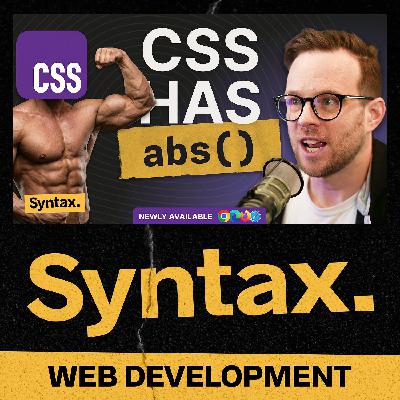

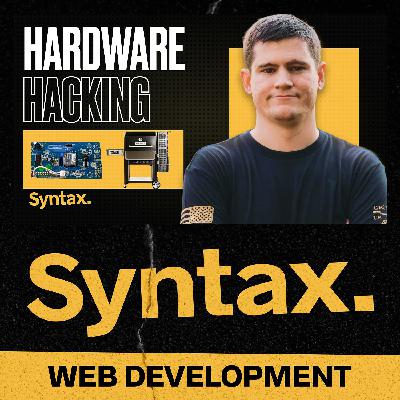
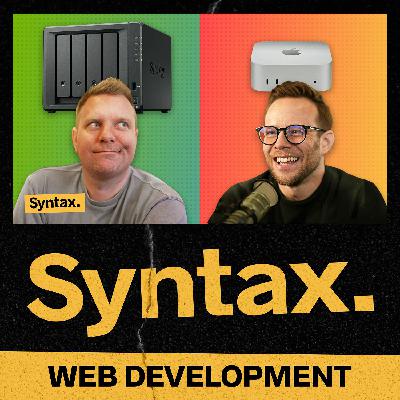
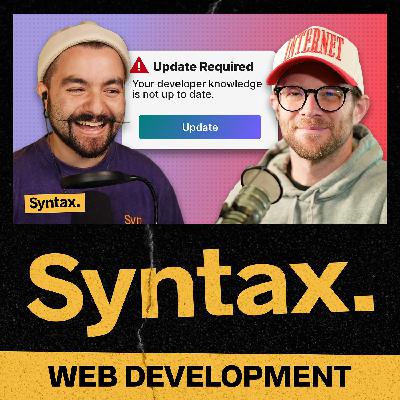
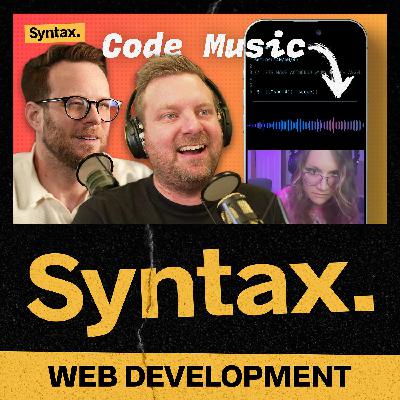
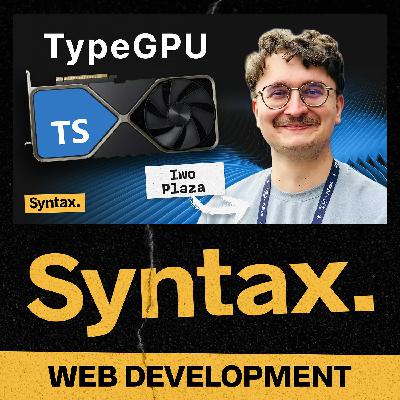

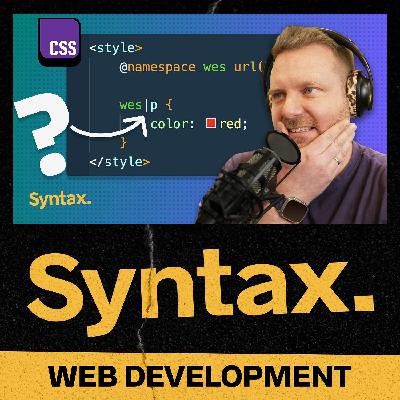
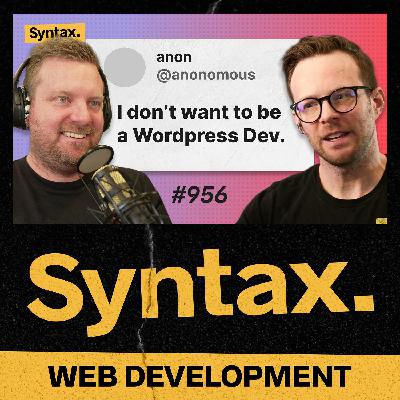
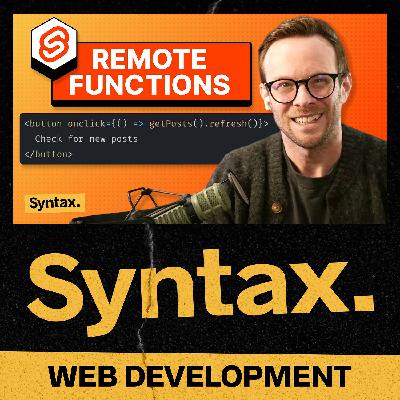
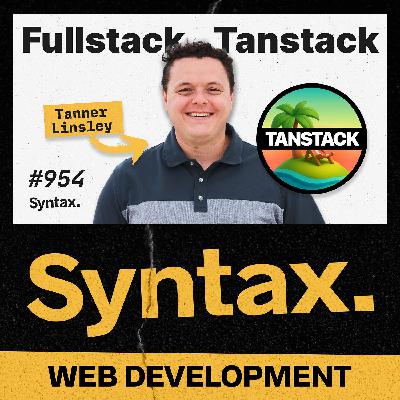
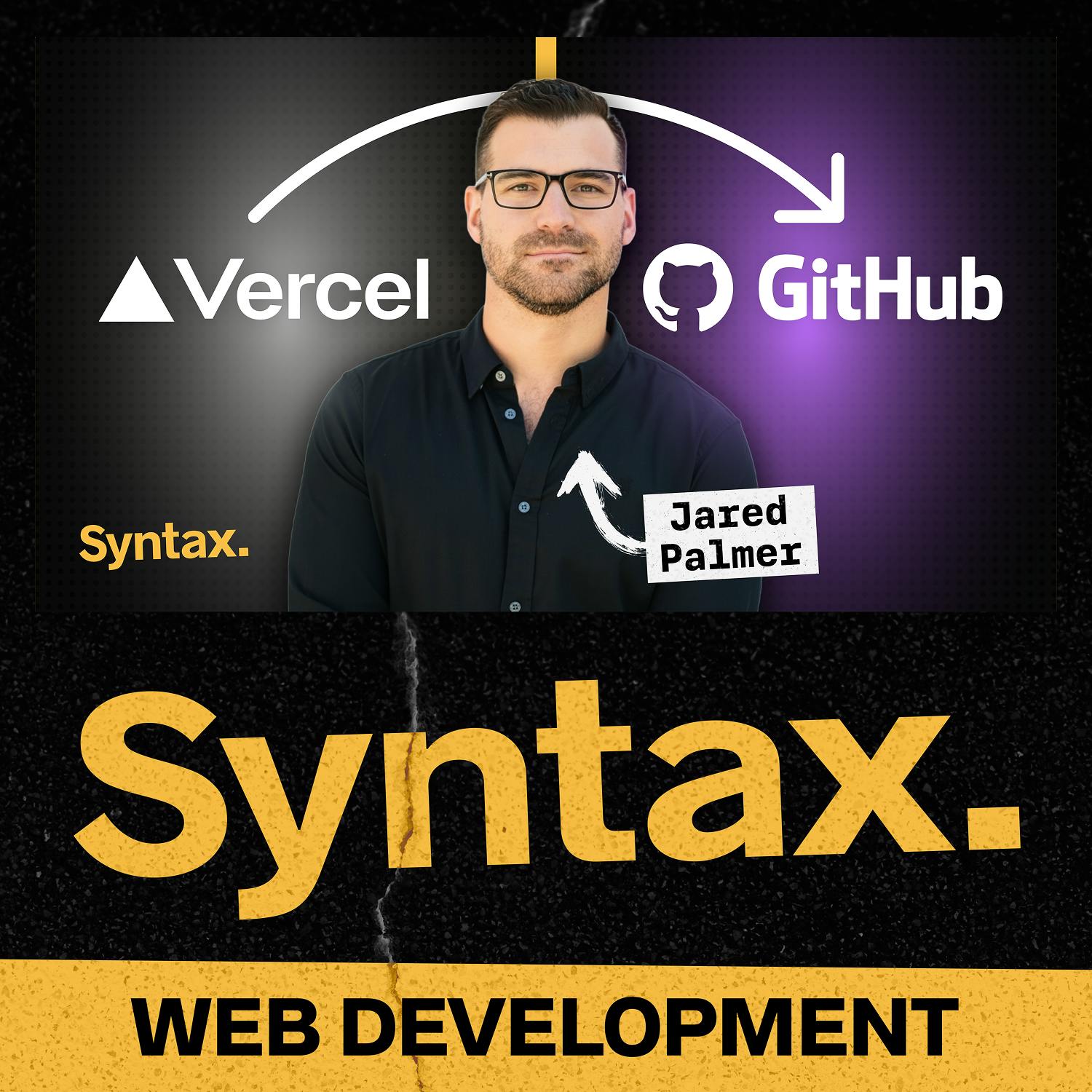


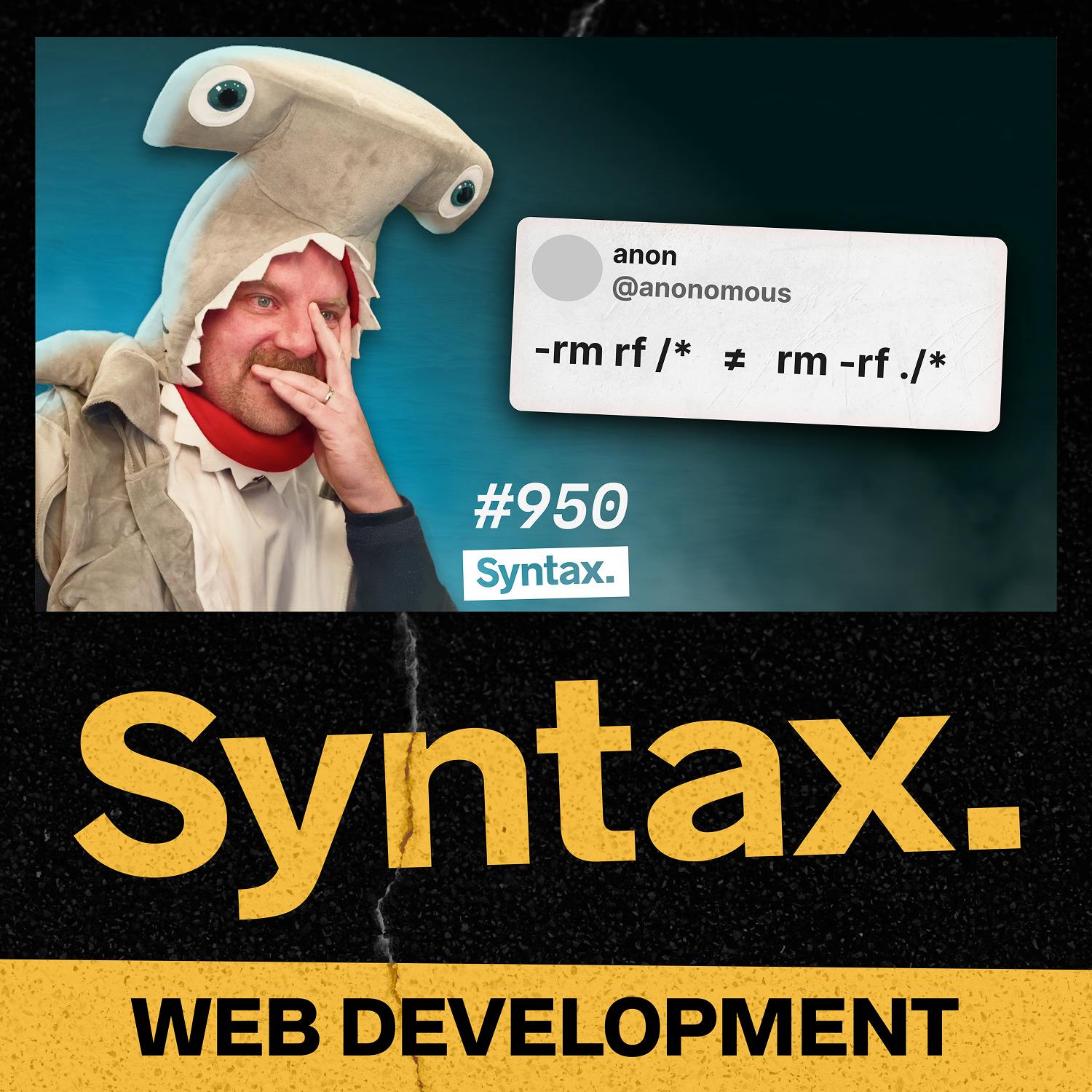

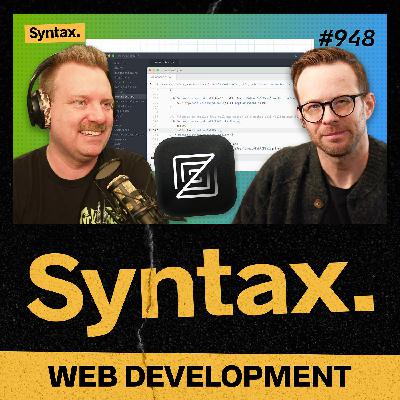
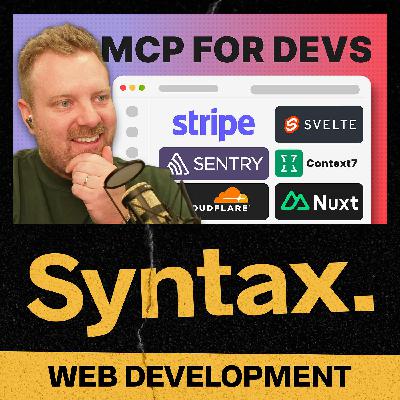



Attract Group's Progressive Web App (PWA) https://attractgroup.com/expertise/progressive-web-app-development-services/ development services stand out for their commitment to delivering high-performing, reliable, and scalable applications. Their team of experienced professionals leverages the latest web technologies and PWA standards to create custom solutions tailored to unique business requirements. By focusing on intuitive user interfaces, quick animations, and native-like experiences, they ensure enhanced user engagement and satisfaction. Additionally, their transparent pricing and cost-effective development options make them a valuable partner for businesses looking to maximize return on investment without compromising on quality. Their comprehensive services, including PWA migration and quality assurance testing, further solidify their position as a top-ranked PWA development company.
If you're serious about leveling up your web development career, this episode is a must-listen. For more tips and expert insights, also check out https://dextersol.com/ your go-to resource for web development excellence.
very good episode thx
nice podcast, but it was hard to find it. keep on guys ~~
🔴💚Really Amazing ️You Can Try This💚WATCH💚ᗪOᗯᑎᒪOᗩᗪ👉https://co.fastmovies.org
🔴WATCH>>ᗪOᗯᑎᒪOᗩᗪ>>👉https://co.fastmovies.org
this changes the game, no more Sass needed!!!
ChatGPT recommend me this podcast :)
768 is in bootstrap
aww I so much regret choosing @vuejs over @react back 2 years ago. ☹
don't need to translate hex to decimal, just remember the closer to f it is, the closer to 255 it is. So if it is 88 it is close to 125.
so what do you use if not bootstrap and font awesome?
when I'm listening to these guests I always think these apps should have a home page for dummies, where they explain what this is about and who is their target group. I listen for an hour and have no clue what they are talking about.
great show an I like his books as well!
you misspelled his name.
huh? Wes has a bot to filter and respond questions about ide? 🤣
21:47 what? thanks for doing a good job? forget it.
I must say your grammar has no issues. If we'd take out "y'know", "I mean", "yeah", "it's like" from shoptalkshow, their episode would be 75% shorter. 😁
Thanks for sharing.I found a lot of interesting information here https://blog.exporthub.com/
omg I'm so far behind! and mycompany is double so!